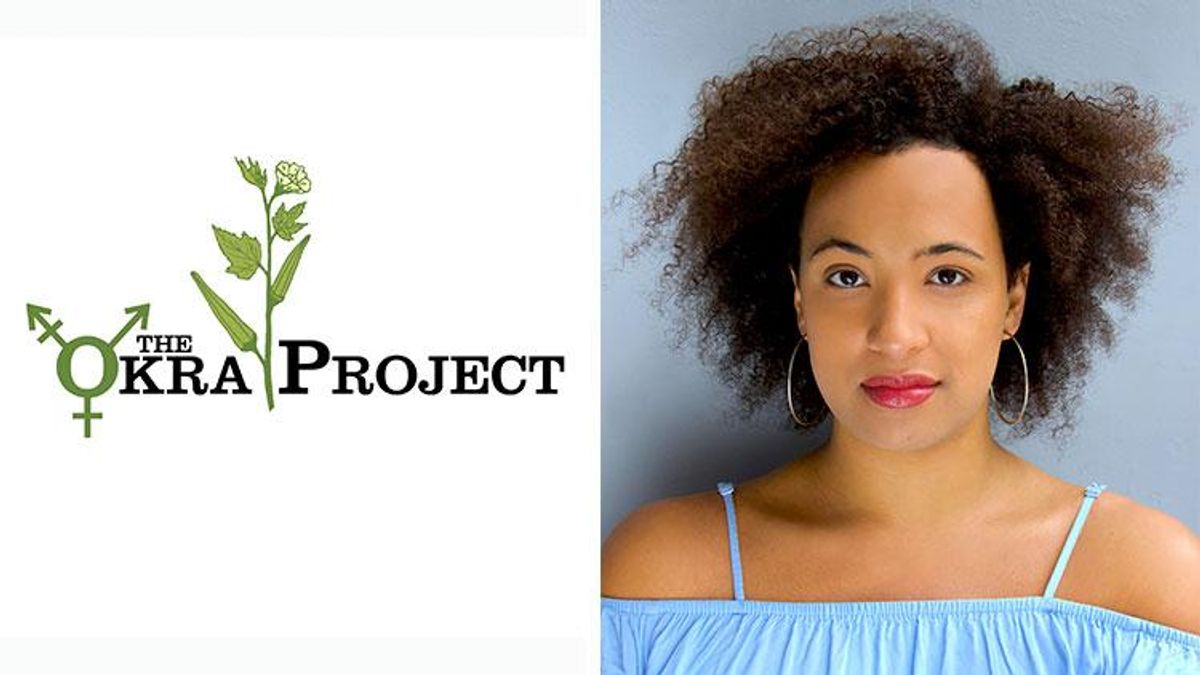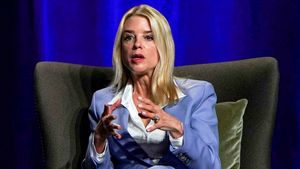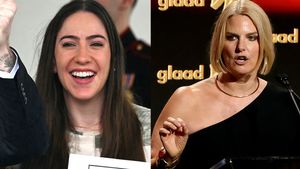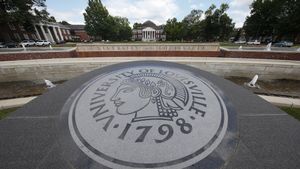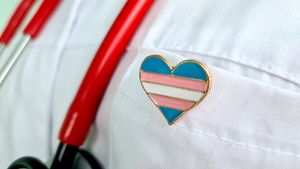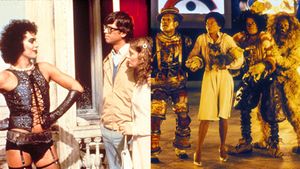The Okra Project was founded nearly a year and a half ago by Ianne Fields Stewart to combat food insecurity in the Black transgender community. However, extraordinary events like the pandemic and protests have expanded its mission while making its work more essential than ever.
In the wake of the recent killings of transgender folks Nina Pop and Tony McDade, The Okra Project established the Nina Pop Mental Health Recovery Fund and the Tony McDade Mental Health Recovery Fund in order to connect Black transgender and nonbinary people with mental health services. On Thursday night, Twitter and Square cofounder Jack Dorsey announced that he was donating a $75,000 grant for the organization via his new philanthropic project Start Small, which aims to give $1 billion to charity.
Below, Stewart, a Black queer transfeminine storyteller working at the intersection of theater and activism, discusses the founding of The Okra Project and how readers can support its services.
How are you feeling right now?
I'm grateful for all the love The Okra Project is getting. I am definitely overwhelmed with the realities of everything that we're dealing with and trying to take care of myself as much as I can and taking care of my people.
Tell us your background and what called you to activism.
Essentially, I have always been doing activism work ... and doing more and more intentional work around that. And then[one day], I was in a [phone] meeting with other activists, and I felt like I wasn't really being heard. There was a masculine person in the space who was talking over me. And so I put myself on mute and turned to my friend .... Nyla Sampson, who had created the Black Trans Solidarity Fund, which the reparations group dedicated to distributing funds from the general public back into the hands of Black trans people. I turned to her and proposed the idea of The Okra Project, of hiring Black trans chefs to cook healthy home-cooked and culturally specific meals for Black trans people in their homes or in community spaces if they are currently experiencing homelessness. She said she was down.
[Then,] we contacted my friend Meliq August, who ran Zaddy's Kitchen, a private trans chef service. We talked to Malik on a Monday. On a Wednesday, we released the project. And by that Friday, we had raised $6,000. We said that we would do this [work] until the money runs out, and the money is just not running out. So, a year and five months later, we are still growing and expanding and finding new ways to serve Black trans people wherever we can reach.
What is the work that you're doing right now in this historic moment?
Initially, as emergency responses when this all first happened, we were working with local food organizations to get grocery donations. We already had created the international grocery fund to send like $40 to trans people around the world so they can buy groceries for themselves.
We found that eventually, that wouldn't work as far as our capacity as an organization run by three people, and also as far as maintaining social distancing and making sure that everything was prepared safely. It just wasn't really possible. So, we shifted our work to be focused on financial distribution and supporting people. We've paid Black trans people's rent. We paid their bills. ... We posted bail for Black trans folks doing. Just everything we can to make sure that people are taken care of and have what they need during this time of crisis.
Most recently, Sunday, we dedicated $15,000 to creating the Nina Pop Mental Health Recovery Fund and the Tony McDade Mental Health Recovery Fund. [Editor's note: Since, the community has raised $20,000 to match that initial investment] These funds are dedicated to paying for onetime, 100 percent free mental health services for Black trans women, Black trans men, and Black nonbinary folks to be with either a Black male or a Black female or a Black nonbinary therapist. All of this is in honor of Nina Pop, and Tony McDade, and all the other Black trans people who have been murdered by state-sanctioned violence. And when I refer to state-sanctioned violence, I'm not just referring to police brutality but referring as well to the epidemic of violence that Black trans, in particular, Black trans women are facing, when they are murdered by civilians and the state does little to nothing to catch their killers.
You went down yesterday to the Stonewall Inn to deliver a message. Can you reiterate what that message was?
I was honoring and holding space for Black people as a whole to remember that this moment is for us. It is something we deserve. I was also saying to white people that this newfound energy ... that is making people, who before have done nothing, now stand up and say something and actually seemingly back up with their word, that energy needs to continue through 2021, 2022, 2023, and onward.
It's Pride right now as well. What is it really important for LGBTQ+ people to remember during Pride season this year?
This moment, this rebellion, this revolution that's occurring started 51 years ago at Stonewall. It is incredibly important for us to remember that the struggle for Black people as a whole -- and Black people is inclusive of Black LGBTQ people -- that that struggle has been going on for hundreds and hundreds and hundreds of years. I think that it's really important for us to remember that the division that has been created, that there are countless stories that we will never hear about because of the effects of the transatlantic slave trade. We will never hear about Black queer people who were slaves, because their narratives will never be documented and were never documented. Or there are very few that have been documented that have been protected.
I think it's incredibly important for us to remember that Black LGBTQ+ people face violence from so many different sides. We face violence from, sometimes, our families. Sometimes, we face it from our place where we wish to be employed, our housing situations. And I think that it's also important for non-Black LGBTQ+ people to remember that proximity to whiteness is very much an aspect [that] leads to violence. One's proximity to whiteness is absolutely 100 percent a way that people are led to violence. There are white LGBTQ+ people, who at their core, whether they want to admit it or not, have been trained to understand that the police, the state is inherently on their side. And so, in their moment, their instinct of fight or flight, white LGBTQ+ people must do extra work to root out the system that exists at their very core, because society has trained white people as a whole to understand that state-sanctioned violence is in place to protect their peace of mind. Our deaths are there to maintain their peace. And so I think that for white LGBTQ+ people, it is crucial that they understand that this is a core that has been instilled in them since the beginning of this country. And it must be rooted out.
What other ways can Out readers support you and The Okra Project?
Out readers can donate to The Okra Project at PayPal.me/TheOkraProject. Out readers who are also Black therapists can reach out to us at admin@theokraproject.com.
Related | All You Need to Know About 2020's Black Lives Matter Uprisings
